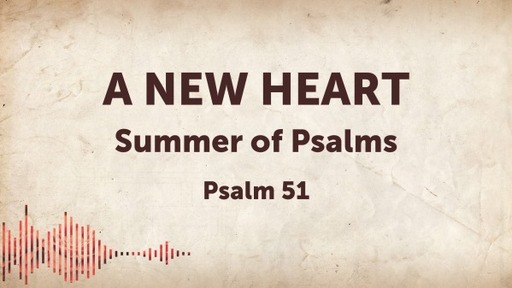A New Heart

Notes
Transcript
Is there value in sin?
Is there value in sin?
Thought provoking question. Or at least it was for me as I read it this week in one of the commentaries I was studying from.
The answer: it depends.
The answer: it depends.
Sometimes the truth is absolutely not. Other times it may be a tentative “yes”. I am NOT encouraging anyone to sin, but instead hoping we will allow this Psalm, that for many who have been in the church for a long time know, to re-teach us anew this morning.
Am I too messed up?
Am I too messed up?
The context is 2 Samuel 11 & 12.
The context is 2 Samuel 11 & 12.
Here is what we read of the context:
In the spring, at the time when kings go off to war, David sent Joab out with the king’s men and the whole Israelite army. They destroyed the Ammonites and besieged Rabbah. But David remained in Jerusalem.
Sin starts slowly and “innocently”.
Sin starts slowly and “innocently”.
The first sin, in my opinion, was not looking at Bathsheba. It was he was not with his troops. He stayed when he was to go.
Sin is first and foremost against God.
Sin is first and foremost against God.
David is not saying it is only to God. Sometimes this is the case but most of the time the sin of one person effects others. The sin of a community reaches far beyond just those who commit it.
Sin is “normal”.
Sin is “normal”.
We are so used to it we cannot know a time without it. We call this “original sin” in some circles but the point is not just we all sin from the beginning, though this is important to remember, but that we can be so used to sin we fail to see it as sin.
Sin has consequences.
Sin has consequences.
In our Psalm the consequences is a disrupted relationship with God. There is no longer any joy. David wants the “joy of his salvation” to be restored. He wants his bones to rejoice again.
Beyond this his sin with Bathsheba set up turmoil and issues in his own house. He would later flee from his own son.
Sin produces shame.
Sin produces shame.
Shame of “I messed up. But also shame in, “I’m a horrible person.”
We need to be aware of our sin.
We need to be aware of our sin.
David uses three different words for “sin” in this Psalm to indicate he completely understands not just his one sin but all the sins which lead up to one another. We need to be aware not so we are ashamed of who we are but so we can deal with the sin in our life.
Our sin does not overpower God’s mercy.
Our sin does not overpower God’s mercy.
I’m concerned sometimes as we focus on sin so much we can miss this point. David turns to God and not only is he aware of his son but he is also aware of God’s mercy and love. The faithful love of God which does not change because of our actions or inaction. Our sin does not change God for God cannot be changed.
God alone can cleanse.
God alone can cleanse.
As hard as we try to put ourselves back together we can’t. Christ alone is the healer, forgiver, and putter back togetherer.
God gives new hearts.
God gives new hearts.
This is what we need. We need a new spirit and a new heart to start to be different. Our goal is to live out this newness from the inside out. Our worship, baptism, forgiving other, forgiving ourselves, loving others all come from the reality on the inside. We may do “religious/spiritual” things on the outside but unless it is true on the inside we miss the point.
We must be vulnerable.
We must be vulnerable.
This means opening up and allowing others to open up. We must be vulnerable with God. This is only possible if we believe God not only deals with sin, but does so lovingly.
We need to be authentic.
We need to be authentic.
This is the point of verse 6 and the word “faithfulness”. Yet, many of us hide parts of ourselves from God and others. I am not suggesting everyone needs to know everything. That is not healthy. There are unsafe people in our world and even in our churches.
Sin can be redeemed. BUT GOD…!
Sin can be redeemed. BUT GOD…!
This is the point of verses 13-15. David had confidence because of who God is that his sin would not have the last word. Because of what Christ did on the cross we have that same confidence. Not because we deserve it, but because God gives it.